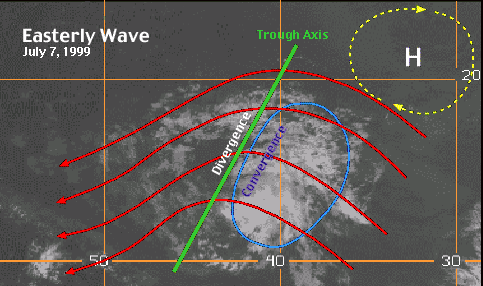can someone tell me
Moderator: S2k Moderators
Forum rules
The posts in this forum are NOT official forecasts and should not be used as such. They are just the opinion of the poster and may or may not be backed by sound meteorological data. They are NOT endorsed by any professional institution or STORM2K. For official information, please refer to products from the National Hurricane Center and National Weather Service.
- wzrgirl1
- S2K Supporter

- Posts: 1360
- Joined: Sat Sep 04, 2004 6:44 am
- Location: Pembroke Pines, Florida
can someone tell me
what is the difference between a wave axis and a squall line...I mean what is the technical difference?
0 likes
-
spinfan4eva
- Category 1

- Posts: 295
- Joined: Tue Aug 23, 2005 1:27 am
- Location: Jacksonville, Florida
- Contact:
Im not 100% sure but picture an eastern wave as a westward moving cold front with a squall line. The squall line becomes a dry line or trough of low pressure like they occur in the Midwest in the spring. This is how I think of it with mesos that form a low which could become a TC. Someone correct me if I am wrong.
0 likes
- senorpepr
- Military Met/Moderator

- Posts: 12542
- Age: 43
- Joined: Fri Aug 22, 2003 9:22 pm
- Location: Mackenbach, Germany
- Contact:
Re: can someone tell me
wzrgirl1 wrote:what is the difference between a wave axis and a squall line...I mean what is the technical difference?
Good question!
A wave axis is normall assoicated with a tropical wave. This shouldn't be confused with a tropical low than has a broad area of circulation. A wave, or trough as it's known for features over land, is an area of lower pressure, but not low enough to have a "closed-off" isobar -- otherwise a closed circulation. The axis of this wave, or trough, is the greatest point of cyclonic curving.
Now, normally with waves, this "troughs" are inverted or "dips" poleward. Usually with mid-latitude troughs that affect the US, the troughs dip equatorward. Check out this link (http://iwave.rsmas.miami.edu/surf/images/tanal.1.gif). Along the ITCZ, you should see the waves pointed out with a slightly curved line. This line is the "wave axis" or the point where there is the greatest curving.
As for a squall line... that is a line of thunderstorms that have formed along the same lifting mechanism -- fronts, outflow boundaries, gravity waves, even isentropic lifting.
Usually squalls form ahead of a cold front or dry line where there is the best pool of moisture, life, and instability. Check out this link (http://www.theweatherprediction.com/habyhints/150/squall2.gif) for a radar image of a squall.
Let me know if this answers your question or if you have further questions.
0 likes
- Hyperstorm
- Category 5

- Posts: 1500
- Joined: Sun Sep 07, 2003 3:48 am
- Location: Ocala, FL
Excellent explanation by Senorpepr!
Just wanted to add that these tropical waves are called waves because they create a "wave" in the otherwise usual easterly (trade) winds of the tropics. Here's an image of a tropical wave overlayed with the oscillation of low-level winds associated with them:

Sometimes these waves have a vigorous and large low pressure with them over Africa and they can create a squall line as they move off the coast. These are similar to the squall lines that are produced by cold fronts, but they move westward until they dissipate. They are associated with very high winds.
Just wanted to add that these tropical waves are called waves because they create a "wave" in the otherwise usual easterly (trade) winds of the tropics. Here's an image of a tropical wave overlayed with the oscillation of low-level winds associated with them:

Sometimes these waves have a vigorous and large low pressure with them over Africa and they can create a squall line as they move off the coast. These are similar to the squall lines that are produced by cold fronts, but they move westward until they dissipate. They are associated with very high winds.
0 likes
Who is online
Users browsing this forum: No registered users and 110 guests

